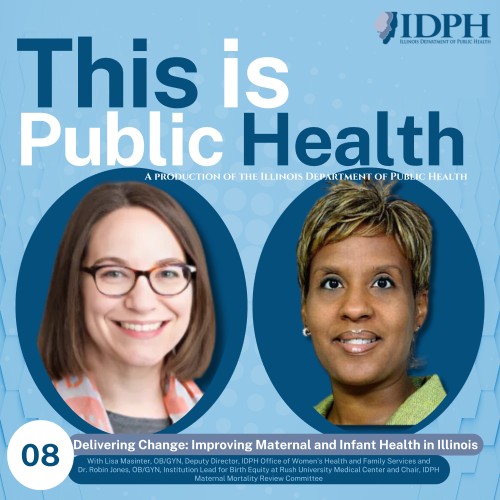Dr Lisa Master: Happy to do it. And really, it is a difficult act to follow, and I think that all those who listen now can understand why Dr. Jones occupies such a special place in my heart and my personal and career history.
Dr Lisa Master: But what I’m going to say is that I will approach some things that reflect and highlight where the state tries to treat all the things that Dr. Jones has raised. This is by no means an exhaustive list but just a few specific examples. At the Illinois Ministry of Public Health, we finance several efforts thanks to various financing mechanisms which aim to improve health throughout the life of reproduction.
Dr Lisa Master: Firstly, we finance the Illinois Périnatal Quality Collaborative and Partnership with other donors with the aim of implementing quality improvement efforts in state birth hospitals, once again approaching Dr. Jones has just mentioned.
Dr Lisa Master: We also finance something called the administrative perinatal centers which work as support centers for state hospitals to provide care based on evidence and also what is called appropriate risk care, so that when someone enters any hospital through the state of Illinois, bearing a high -risk pregnancy, this person will be brought and communicated via the higher level of care Risks.
Dr Lisa Master: Likewise, a person at a lower risk can be taken care of in a lower level of care hospital and the administrative perinatal centers work like the centers of this support.
Dr Lisa Master: We also work with the University of Illinois in Chicago to create and implement a tool training tool for emergency services to provide studies and resources to emergency services, especially in places where they do not have obstetric and safeguarding for pregnant and postpartum who present themselves to obtain an appropriate reference and treatment.
Dr Lisa Master: More recently, we have financed twelve community organizations, and I cannot go into details, but they all do an incredible job to be in the community, promoting maternal equity and births from the community point of view and a community objective in partnership with many organizations in any part of the state in which they are located.
Dr Lisa Master: I also want to mention our partner agencies who also work to raise efforts. Dr. Jones said he had access to care. Illinois was the first state to extend Medicaid throughout a year of postpartum. And during this calendar year, Illinois Medicaid is implementing a new reimbursement for service providers of perinatal support services such as Doulas, lactation support suppliers, home visitors and midwives who provide births outside the hospital, many of these support services for which to have an impact and influence actions.
Dr Lisa Master: The Ministry of Social Services grants subsidies to other community partners providing home visit services and case management services, and they are the main agency working on the impact of unstable housing and consumption disorder on maternal health.
Dr Lisa Master: And finally, I would like to highlight the importance of reproductive health care as a key engine to reach maternal health equity. If we really want to prevent bad results during pregnancy and infants poor, we want to make sure that all pregnancies occur when people are as healthy as possible and they are ready and plan to be pregnant.
Dr Lisa Master: Illinois remains a state and has become a real beacon for reproductive health care, as evidenced by the commitment of our governor, our partner agencies, to implement as much effort as possible in an incredibly innovative way to preserve access to high -quality comprehensive reproductive health care and I am incredibly grateful and proud to be part of the effort.


